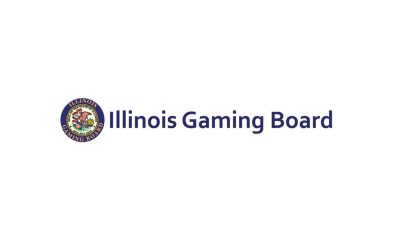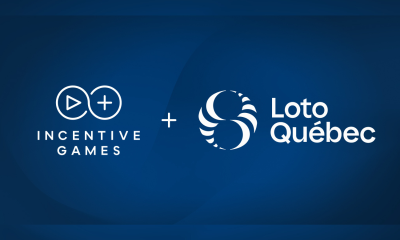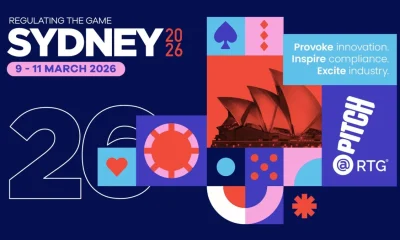Canada
PlayCT.com: Connecticut opening door to market that could draw more than $1.5B in sports bets annually
Connecticut could evolve into a market that generates more than $1.5 billion in annual sports wagers and more than $100 million in operator revenue according to estimates by PlayCT, which analyzes and researches the state’s regulated online gaming and sports betting market. Meanwhile, online casinos could generate as much as $350 million in gross gaming revenues annually, becoming a huge tax generator for the state.
“Connecticut is a relatively small state, but the market has a handful of attributes that should help it punch a bit above its weight,” said Eric Ramsey, analyst for the PlayUSA.com network, which includes PlayCT.com. “Geographically, the state is in a good place, with the potential to draw significant out-of-state business from New York and Massachusetts. And Connecticut features one of the highest median household incomes in the U.S. Both factors should help the market reach maturity relatively quickly.”
Gov. Ned Lamont, who negotiated the agreements with the Mashantucket Pequot and Mohegan tribes to amend gaming compacts, signed the bill that would legalize retail and mobile sports betting, online casinos, online poker rooms and iLotteries. Now the U.S. Bureau of Indian Affairs will have to sign off on the compacts.
Once that happens, Connecticut will join more than two dozen states with legal sports betting in some form, and join New Jersey, Pennsylvania, Michigan, Delaware, and West Virginia as the only states with full-scale legal online casino gambling.
With a population of more than 3.5 million people, Connecticut could produce more than $1.5 billion in retail and online sports wagering by the market’s third year, according to PlayCT projections. Assuming a 7% “hold,” which is the percentage sportsbooks keep after paying out winning bets, those wagers could produce more than $100 million in operator revenue. With some significant variables still yet to be defined, tax revenue for the state is more difficult to project. But with a hypothetical effective tax rate of around 25%, more than $25 million could be injected into state coffers annually.
Iowa — which launched retail sports betting in 2019 and online sports betting in 2020 — may be Connecticut’s closest comparison in terms of population among current legal sports betting markets. With some 400,000 fewer residents but with a more open market that fosters more consumer choice than Connecticut, the Hawkeye state has produced $572.9 million in online and retail sports bets and $40.2 million in gross operator revenue through the first four months of 2021.
“Connecticut will be a successful market, and likely a significant revenue driver for the state for years to come,” said Dustin Gouker, lead analyst at PlayUSA.com. “The state’s high median income and proximity to New York should be significant contributors to the market’s growth, particularly early on as New York makes its own push into the online sports betting market.”
Online casinos should be even more lucrative, capable of generating close to $350 million in annual gross gaming revenue at maturity, according to PlayCT. If online casinos reach that mark, that would mean as much as $70 million in annual tax revenue for the state.
None of the five states that currently allow full-scale online casino gaming offer a close comparison to Connecticut in terms of market size. But the three largest iGaming markets — New Jersey, Pennsylvania, and Michigan — each generate close to $100 million in operator revenue each month.
“Sports betting grabs more headlines, but in states where it is legal, iGaming has proven to be the far more reliable revenue generator,” Ramsey said. “Plus, history shows that a thriving full-scale online casino gaming market helps spur interest in online sports betting, making it the tide that lifts all boats. And there is no obvious reason that Connecticut won’t follow a similar pattern.”
Powered by WPeMatico
Bet Rite
Spintec Expands into Canada with Bet Rite

Spintec is expanding its footprint in North America by partnering with Bet Rite in the Canadian gambling sector. As a prominent developer of electronic table games, Spintec invested significant effort into locating a partner who comprehends the distinctiveness of the Canadian casino industry. Bet Rite is taking on the position of Spintec’s distributor in Canada, leveraging its established reputation and substantial industry knowledge. This collaboration combines global innovation with local expertise in a partnership that is helping Spintec advance its expansion objectives in North America.
Bet Rite’s establishment is rooted in years of industry expertise. The firm focuses on providing top-notch gaming solutions designed specifically for Canadian operators. They aim to provide a sole vendor connection that grants access to numerous top-tier product lines, establishing them as a reliable partner nationwide.
For Spintec, collaborating with a company that prioritizes service, product excellence, and enduring relationships is vital, and Bet Rite is dedicated to prioritizing customer needs. With a solid sales network and a reputation for dependability, their market stance is highly strong.
Through this collaboration, Spintec is guaranteeing that their creative products receive backing from an attentive, community-focused service. The initial product line to be launched in the Canadian market will be Spintec’s premier Charisma line. Charisma’s design, flexibility, innovation, and wide range of product customizations will undoubtedly make it a top seller in Canada as well.
Billy Maclellan, Bet Rite President, says: “Our company has grown by offering best-in-class suppliers the local support that they need. Spintec fits the mold perfectly and together we are well placed to make this partnership a glowing success”
Goran Sovilj, Spintec’s Chief Commercial Officer, agrees: “Bet Rite’s deep understanding of the Canadian market makes this alliance very promising. We are always excited to introduce innovative and exciting products to new markets, especially when our distributors are as experienced and knowledgeable as Bet Rite.”
The post Spintec Expands into Canada with Bet Rite appeared first on Eastern European Gaming | Global iGaming & Tech Intelligence Hub.
Canada
Gaming Corps takes flight in Ontario with High Flyer Casino partnership

Gaming Corps, the Sweden-based publicly listed game development studio, has secured a new content partnership with High Flyer Casino, an AGCO-licensed online gaming operator in Ontario, Canada. The agreement marks another strategic step forward for Gaming Corps as it continues to grow its footprint in one of North America’s most competitive regulated iGaming markets.
As part of the deal, a curated selection of Gaming Corps’ slot titles will be made available to High Flyer Casino players across Ontario. The initial launch includes 3 Pigs of the Caribbean, a swashbuckling instalment from the well-known 3 Pigs franchise, alongside Savannah Stacks, a high-volatility slot inspired by the thrills of a safari adventure.
High Flyer Casino has established itself as a slots-focused operator with a strong reputation for value-driven, mobile-first gaming experiences tailored to Canadian players. Operated by Ellipse Entertainment Limited, the company draws on more than 25 years of industry expertise and offers a diverse portfolio that features over 100 exclusive games. Its offering is further enhanced by the proprietary Reel Jackpot brand, popular Money Spinner titles, and a wide range of progressive slots.
Commenting on the partnership, Adam Pentecost, Chief Revenue Officer at Gaming Corps, said:
“High Flyer Casino has carved out a clear position in Ontario with a focused slots strategy and a strong understanding of what local players are looking for. Bringing our most recognisable titles to their platform allows us to reach a highly engaged audience in a market that continues to set the pace in North America. This agreement represents another meaningful step in expanding our distribution with operators who value distinctive content and long-term portfolio growth.”
Man Mac, Head of Marketing at High Flyer Casino, added:
“At High Flyer Casino, we are building a slot lineup that blends proven player appeal with unique and memorable gaming experiences. Gaming Corps’ portfolio fits perfectly with that approach, delivering polished, entertaining games that are full of personality.”
The post Gaming Corps takes flight in Ontario with High Flyer Casino partnership appeared first on Eastern European Gaming | Global iGaming & Tech Intelligence Hub.
Canada
CasinoCanada and GG.BET Forge Strategic Alliance

CasinoCanada is delighted to reveal a collaboration with GG.BET, a prominent global platform for esports and sports betting. This partnership will broaden GG.BET’s footprint in important regional markets and deliver focused, captivating content for fans of esports and sports wagering.
In this partnership, CasinoCanada will team up with GG.BET to create tailored reviews and SEO-focused content for local audiences. This initiative will enhance GG.BET’s exposure and provide players with trustworthy information and a smooth user experience.
CasinoCanada is an online gaming guide run by SEOBROTHERS.
Eugene Ravdin, Head of PR at SEOBROTHERS, commented: “GG.BET is a pioneering force in the esports betting space, combining innovation with deep industry knowledge. Partnering with CasinoCanada aligns perfectly with our goal to support platforms that prioritise player engagement and responsible growth. Together, we look forward to delivering valuable content that resonates with esports and sports fans alike and contributes to the sustained success of GG.BET.”
GG.BET is a global wagering platform created by esports specialists to provide an exceptional esports betting experience along with a variety of conventional sports betting choices. The platform provides over 30 esports categories, featuring both console and mobile games, along with more than 40 conventional sports.
GG.BET additionally offers AI-driven virtual sports, including virtual leagues for football, basketball, and tennis. The platform improves user interaction with a tailored feed and a customizable gaming avatar that develops as players progress through GG.Leagues stages. GG.BET emphasizes player safety and client support, upholding strict standards in data security and user assistance.
GG.BET fosters esports growth through collaborations with teams and sponsorships of prominent tournaments, such as BLAST Premier (CS2), PGL Major, and Dota 2’s The International. Since 2020, GG.BET has partnered with NAVI and Team Vitality’s CS2 lineup.
The brand has gained international acclaim, securing the Best Esports Operator title at the EGR Operator Awards 2023 as well as the SiGMA Europe Awards 2023. This achievement persisted with the Esports Operator of the Year accolade at the EGR Global Operator Awards 2024, succeeded by Operator of the Year for Central and Eastern Europe at the EGR Global Europe Awards 2025.
Serhii, Head of Affiliates at GG.BET, added: “We’re pleased to launch our partnership with CasinoCanada. Their strong regional expertise and engaged audience make them a valuable partner for us. We see great potential in this cooperation to strengthen GG.BET’s presence in the region and build long-term growth together.”
The post CasinoCanada and GG.BET Forge Strategic Alliance appeared first on Eastern European Gaming | Global iGaming & Tech Intelligence Hub.
-

 Amusnet7 days ago
Amusnet7 days agoWeek 6/2026 slot games releases
-

 Arshak Muradyan7 days ago
Arshak Muradyan7 days agoDigitain Secures UKGC Certification for Sportsbook and Platform
-

 Compliance Updates4 days ago
Compliance Updates4 days agoIllinois Gaming Board and Attorney General’s Office Issue more than 60 Cease-and-Desist Letters to Illegal Online Casino and Sweepstakes Operators
-

 Latest News7 days ago
Latest News7 days agoHyper Gems — A New Cosmic Adrenaline Release from Dream Play
-

 Latest News4 days ago
Latest News4 days agoLaunch Of A Fresh Online Casino Guide 2026
-

 Canada4 days ago
Canada4 days agoINCENTIVE GAMES PARTNERS WITH LOTO-QUÉBEC TO LAUNCH REAL-MONEY GAMES IN THE PROVINCE OF QUÉBEC, CANADA
-

 Always Up! x100004 days ago
Always Up! x100004 days agoRing in the Chinese New Year with BGaming’s Seasonal Promotion
-

 Australia4 days ago
Australia4 days agoRegulating the Game 2026 Sydney — One Month Countdown as Sector Leaders Anticipate Inaugural RTG Global Awards



















